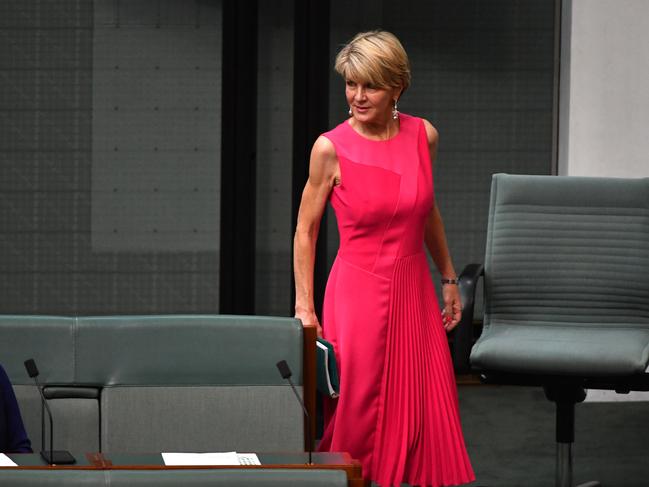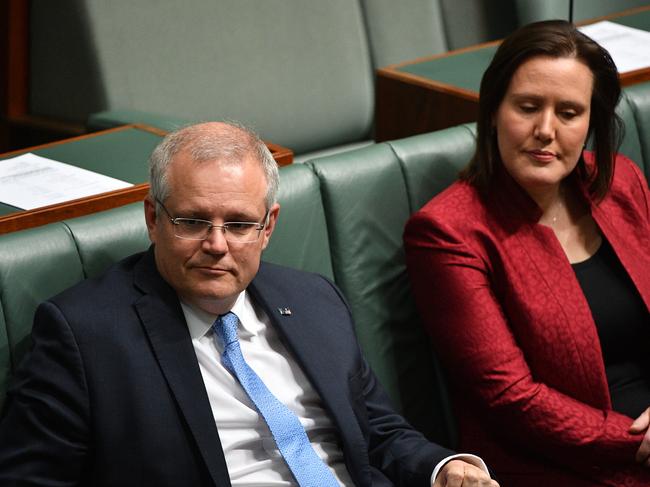Julie Bishop calls for deal on dumped National Energy Guarantee with Labor
Julie Bishop has thrown down the gauntlet to conservatives within Coalition ranks, saying the government must come to an agreement with Labor over the dumped National Energy Guarantee.
Companies
Don't miss out on the headlines from Companies. Followed categories will be added to My News.
Julie Bishop has urged the government to come to an agreement with Labor over the dumped National Energy Guarantee which was championed by Malcolm Turnbull.
In a blunt message that shows the ongoing division in government ranks over climate and energy policy, the former Foreign Affairs Minister says the NEG is the only way to achieve the “elusive” bipartisanship on energy that business needs.
The Morrison Government mostly abandoned the NEG in favour of a new energy policy after conservatives within the Coalition’s ranks spoke out against it.
It became the catalyst for the leadership spill which saw Mr Turnbull rolled in August.
But Ms Bishop, now free to speak her mind from the backbench, says bipartisan agreement on energy is paramount.

“The government needs to consider energy policy through the prism of securing bipartisan agreement with Labor, to establish a long-term, stable regulatory framework that will support private-sector investment in generating capacity,” Fairfax Media quoted her as saying.
“The generators need long-term certainty to give them confidence to make large-scale capital investments that will provide affordable and reliable energy, and with an appropriate level of return,” she said.
CRISIS MEETING
Her call comes after Prime Minister Scott Morrison held a crisis meeting yesterday with Victorian MPs who opened up about problems within the party after state Liberals copped a thrashing at the Victorian election on Saturday.
Cabinet minister Kelly O’Dwyer reportedly told colleagues at the meeting that the Liberals were widely regarded as “homophobic, anti-women, climate-change deniers”.
The Herald Sun reports Ms O’Dwyer added that “it’s not who we are as Liberals” but the “crusades” of some MPs had reinforced that view.

Labor threw its support behind the NEG last week as Opposition leader Bill Shorten revealed the $15 billion energy plan the party will take to the next election.
It left business leaders briefly hopeful of an end to the decade-long climate wars in Australia.
Prime Minister Morrison quickly dashed those hopes on Friday, refusing to back the plan developed by now Treasurer and then energy minister Josh Frydenberg.
The government’s current approach to energy involves prioritising reducing household power costs, including by taking a “big stick” to energy companies through new divestiture laws.
Ms Bishop said reliability and affordability of energy was important but “this must and has to be balanced with concerns for our environment and preservation for our planet”.
ANTI-CORRUPTION WATCHDOG
Meanwhile, a push for a federal anti-corruption watchdog is emerging as an issue for the Morrison Government amid revelations the government was working on its own plan to tackle corruption but it was stalled by the leadership spill in August.
Scott Morrison yesterday dismissed calls for a National Integrity Commission, amid a Labor and crossbench bid to get the government to launch one, calling it a “fringe issue” but noting the government was considering other measures to deal with corruption.
Fairfax Media reports today that the federal cabinet was about to decide on an anti-corruption commission in June but the proposal, which was backed by Mr Turnbull and Attorney-General Christian Porter, was derailed by the leadership spill.
Today, Mr Porter told ABC radio he had been working on new measures to tackle corruption for “probably six months”.
“It is not as simple as it looks and the corruption bodies which existed in each of the states and territories had various degrees of success and failure and they’ve been very mixed in terms of their outcomes,” he said.
“If we were to look at improved arrangements in the Australian federal sphere, you would want to learn the lessons and try to design arrangements that gave you the best opportunity to investigate serious corruption and uncover serious corruption.”
He agreed with Mr Morrison it wasn’t the Parliament’s top priority, noting it was more important to pass new encryption laws before the end of the year.


